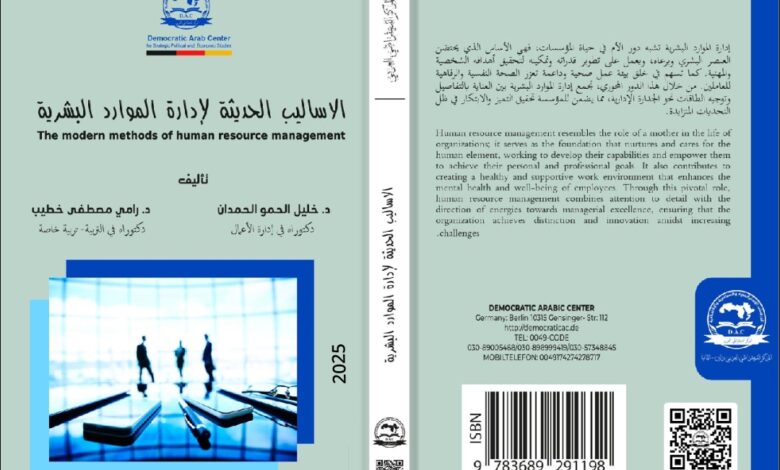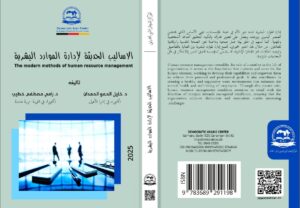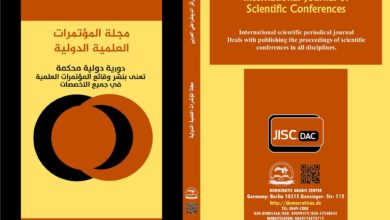الاساليب الحديثة لإدارة الموارد البشرية
The modern approaches to human resource management

تأليف : د. خليل الحمو الحمدان & د. رامي مصطفى خطيب
نسخة “pdf”-
الاساليب الحديثة لإدارة الموارد البشرية
الطبعة الأولى “2025″ –من كتاب : الاساليب الحديثة لإدارة الموارد البشرية
جميع حقوق الطبع محفوظة #المركز_الديمقراطي_العربي ولا يسمح بإعادة إصدار هذا الكتاب أو اي جزء منه أو تخزينه في نطاق إستعادة المعلومات أو نقله بأي شكل من الأشكال، دون إذن مسبق خطي من الناشر .
تقديم : –
يتناول الكتاب مفهوم إدارة الموارد البشرية الحديثة كحقل حيوي يتطور باستمرار، حيث ينتقل من الوظائف التقليدية إلى استراتيجيات أكثر شمولية تعتمد على الشراكة والتعاون. الفكرة الرئيسية تتمحور حول دور إدارة الموارد البشرية في تحقيق الأهداف التنظيمية من خلال التركيز على الصحة النفسية للموظفين وتأثيرات تغيرات سوق العمل.
تتجه إدارة الموارد البشرية اليوم نحو نماذج أكثر ديناميكية، حيث تُعتبر الشراكة مع الإدارات المختلفة جزءًا أساسيًا من الاستراتيجية التنظيمية. هذا التحول يتيح للموارد البشرية أن تكون لاعبًا رئيسيًا في صياغة السياسات وتحقيق الأهداف، مما يعزز من فعالية الأداء ويضمن تلبية احتياجات السوق.
يبرز الكتاب أهمية الصحة النفسية كعامل مؤثر في أداء الموظفين، حيث تؤكد الأبحاث أن الموظفين الذين يتمتعون بصحة نفسية جيدة يكونون أكثر إنتاجية وابتكارًا. لذا، يتناول الكتاب استراتيجيات دعم الصحة النفسية، مثل برامج الدعم النفسي، التي تهدف إلى خلق بيئة عمل إيجابية تعزز من الرفاهية النفسية.
مع تزايد الاعتماد على التكنولوجيا، يستعرض الكتاب كيف يمكن للتقنيات الحديثة، مثل الذكاء الاصطناعي، أن تُحسن من عمليات التوظيف والاختيار. من خلال استخدام أدوات مثل المقابلات الرقمية واختبارات الكفاءة، يمكن للمنظمات تحديد أفضل المرشحين الذين يتناسبون مع ثقافتها واحتياجاتها المستقبلية.
يؤكد الكتاب على أهمية تطوير الأداء من خلال التدريب المستمر، حيث تقدم استراتيجيات مثل التقييم 360 درجة صورة شاملة عن أداء الموظفين، مما يساعد في تحديد مجالات التحسين ويعزز من التفاعل الإيجابي بين الموظفين وإداراتهم.
تشير الفصول المتعلقة بالتحفيز إلى أن الربط بين الحوافز المالية والنفسية يمكن أن يعزز من دافع الموظفين. يتناول الكتاب كيفية تطوير نظم مكافآت فعالة تعكس قيم المنظمة وتساهم في تحسين الأداء العام.
يُبرز الكتاب أهمية القيادة التحويلية ودورها في دعم الصحة النفسية للموظفين، فالقادة الذين يمتلكون مهارات قيادية فعالة يمكنهم توجيه فرقهم خلال الفترات الصعبة، مما يساهم في تعزيز بيئة عمل إيجابية وصحية.
كما يناقش الكتاب مفهوم التنوع والشمولية، حيث يُعتبر هذا العنصر ضروريًا لتعزيز الابتكار وزيادة المشاركة الفعالة بين جميع الموظفين. يؤكد على كيفية تعزيز الشمولية الثقافية وتقليل التمييز داخل المنظمة.
في الختام، يستعرض الكتاب التحولات المستقبلية في إدارة الموارد البشرية، مع تركيز خاص على دور الذكاء الاصطناعي والاتجاهات العالمية نحو توفير بيئات عمل صحية نفسياً. يعكس ذلك التحديات التي قد تواجه الجدارة الإدارية في عالم العمل المتغير، مما يدفع المنظمات إلى استراتيجيات مبتكرة تضمن النجاح المستدام.
باختصار، يقدم الكتاب رؤية شاملة حول كيفية تعزيز إدارة الموارد البشرية الحديثة وتعزيز الصحة النفسية للموظفين كجزء أساسي من تحقيق الأهداف المؤسسية، مما يسهم في بناء بيئات عمل فعالة ومستدامة.
DR. Khalel AlhamoAlhamdan & Rami Mustafa Hatib DR
Abstract
The book addresses the concept of modern human resource management as a dynamic field that is continuously evolving, transitioning from traditional functions to more comprehensive strategies based on partnership and collaboration. The central idea revolves around the role of human resource management in achieving organizational goals by focusing on employees’ mental health and the impacts of labor market changes.
Today, human resource management is moving towards more dynamic models, where partnership with various departments is considered a fundamental part of the organizational strategy. This shift allows human resources to be a key player in shaping policies and achieving objectives, enhancing performance effectiveness and ensuring market needs are met.
The book highlights the significance of mental health as a critical factor influencing employee performance, as research indicates that employees with good mental health tend to be more productive and innovative. Therefore, it discusses strategies for supporting mental health, such as psychological support programs, aimed at creating a positive work environment that fosters psychological well-being.
With the increasing reliance on technology, the book examines how modern technologies, such as artificial intelligence, can improve recruitment and selection processes. By utilizing tools like digital interviews and competency assessments, organizations can identify the best candidates who fit their culture and future needs.
The book emphasizes the importance of performance development through continuous training, where strategies such as 360-degree feedback provide a comprehensive view of employee performance, helping to identify areas for improvement and enhancing positive interaction between employees and their management.
Chapters related to motivation indicate that linking financial and psychological incentives can enhance employee motivation. The book discusses how to develop effective reward systems that reflect the organization’s values and contribute to overall performance improvement.
It underscores the importance of transformational leadership and its role in supporting employees’ mental health, indicating that leaders with effective leadership skills can guide their teams through challenging times, contributing to a positive and healthy work environment.
Additionally, the book discusses the concepts of diversity and inclusion, asserting that these elements are essential for fostering innovation and increasing active participation among all employees. It emphasizes how to enhance cultural inclusivity and reduce discrimination within the organization.
In conclusion, the book reviews future transformations in human resource management, with a particular focus on the role of artificial intelligence and global trends towards providing psychologically healthy work environments. This reflects the challenges that management competency may face in a changing work landscape, prompting organizations to adopt innovative strategies to ensure sustainable success.
In summary, the book offers a comprehensive vision of how to enhance modern human resource management and promote employees’ mental health as a fundamental part of achieving organizational objectives, contributing to the establishment of effective and sustainable work environments.
الناشر: المركـز الديمقراطي العربي للدراسات الاستراتيجية والسياسية والاقتصادية – ألمانيا – برلين
Democratic Arabic Center- Berlin – Germany





